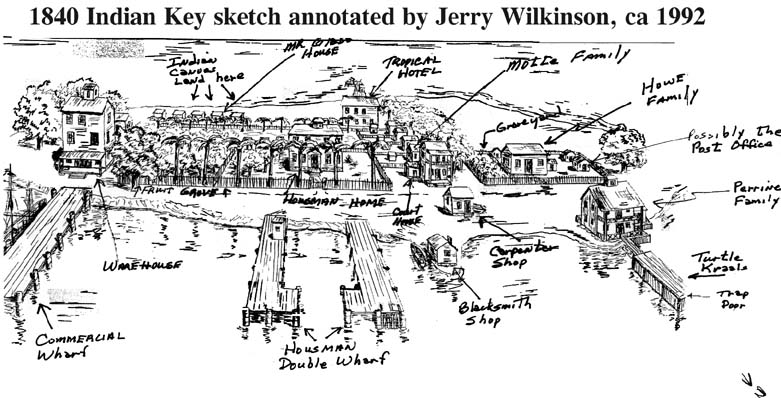Blog


Google Scholar for Genealogy? Here’s Why to Try It
 Recently I heard from Sue Neale, whose story offers a compelling reason to use Google Scholar for genealogy research! Read it below–then I’ll tell you a little more about Google Scholar.
Recently I heard from Sue Neale, whose story offers a compelling reason to use Google Scholar for genealogy research! Read it below–then I’ll tell you a little more about Google Scholar.
“I’ve been using computers for genealogy research (among other things) for about 30 years and am pretty good at finding most anything on the internet whether it pertains to genealogy or something else. It’s a continuous learning experience because computer, the internet and genealogy on the internet are always changing and updating.
[After hearing your seminars at RootsTech 2015], I tried out a couple of Google searches for my husband’s 3rd great-grandfather Silas Fletcher. Silas lived on Indian Key in the Florida Keys in the early 1820s.My husband and I and our son visited Indian Key several years ago and the young lady who took us out in the boat had actually written her college thesis on Silas! Of course, we didn’t think to get her name or any other information. So I Googled “scholar paper Silas Fletcher’ and the first item on the search turned out to be her thesis!
I also found a second thesis on Indian Key and a research paper a third person had written–and they both contained information on Silas. In the footnotes I found references to deed books (book number and page number) that contained statements written by Silas, his wife Avis, their daughter Abigail and Mike’s 2nd great grandfather William H. Fletcher about their lives and movements in the Florida Keys.
With that information I went to Familysearch.org and found the deed books I needed for Monroe County. I was able to go find their statements very easily instead of having to ‘browse’ through the books on the off-chance I would find something (which I do if I don’t know the exact book where the record would be).
I can hardly wait to try out the rest of what I learned at your seminars to see what else I can find!”
Sue’s experience is a great example of using Google to dig for your family history. One little-known feature on Google is Google Scholar, which would help Sue and anyone else more easily find material like what she describes: doctoral dissertations, theses, academic papers and more. Your keyword searches in Google Scholar will target results from academic publishers, universities, professional societies and more.

Though scholarly literature gets a bad rap sometimes for being boring or highbrow, they do something genealogists love: THEY CITE SOURCES. Sue cleverly read the footnotes of the materials she found and they led her right to a key source she needed.
Here’s another resource she could find using the details found on Google Scholar in a Google Image search: a map of his community!
My newly-updated, revised book The 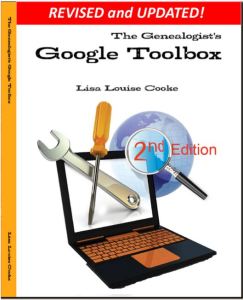 Genealogist’s Google Toolbox has an all-new chapter on using Google Scholar. Among other things, I show you advanced search strategies and how to use Google Alerts with Google Scholar for continuous updates on your favorite search results. Click here
Genealogist’s Google Toolbox has an all-new chapter on using Google Scholar. Among other things, I show you advanced search strategies and how to use Google Alerts with Google Scholar for continuous updates on your favorite search results. Click here
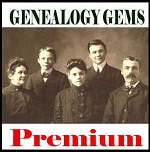
Google for Genealogy: New Search Operators and More
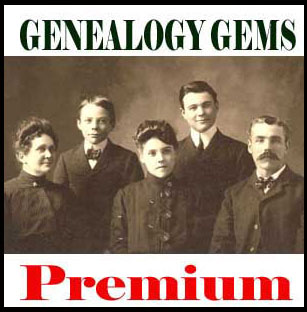 Genealogy Gems Premium Podcast episode 120 is now available:
Genealogy Gems Premium Podcast episode 120 is now available:
The “headline” of this episode is definitely the NEW tips using Google for genealogy. Google changes, so the ways we use it have to keep up if we want to get the most out of it. You’ll learn a few new, obsolete and tried-and-true search operators and strategies for finding your family history with Google.
 These tips come from Lisa’s newly-published, fully revised and updated The Genealogist’s Google Toolbox, 2nd edition. It sold out quickly at RootsTech 2015 but fortunately we have a lot more in stock. Click on the book title to claim your own copy.
These tips come from Lisa’s newly-published, fully revised and updated The Genealogist’s Google Toolbox, 2nd edition. It sold out quickly at RootsTech 2015 but fortunately we have a lot more in stock. Click on the book title to claim your own copy.
Also in this episode, you’ll hear comments from Genealogy Gems listeners and readers. You’ll learn about a new blog started by one of you, for which Lisa gives some helpful feedback. Someone else wrote in to recommend a book title.
The episode concludes with a fun history flashback: a spotlight on the 200-year history of rail travel in the United States.
Not a Genealogy Gems Premium member yet? Click here to learn more about membership benefits, including access to more than 2 dozen how-to genealogy videos and the full archive of Premium podcast episodes.
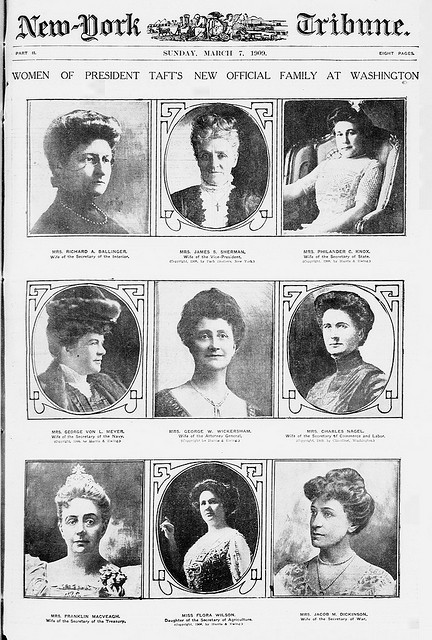
Front Page News! New York Tribune Archive on Flickr

Women of President Taft’s New Official Family at Washington, New York Tribune, March 7, 1909. Cover, illustrated supplement. Library of Congress image, posted at Flickr. Click to visit webpage.
The Library of Congress has a Flickr album that’s front page news–literally! It’s a New York Tribune archive with newspaper covers dating back more than a century.
“This set of cover pages from the New York Tribune illustrated supplements begins with the year 1909,” explains the album. “The pages are derived from the Chronicling America newspaper resource at the Library of Congress. To read the small text letters, just click the persistent URL to reach a zoomable version of the page.”
“Daily newspapers began to feature pictorial sections in the late 1800s when they competed for readers by offering more investigative exposés, illustrations, and cartoons. In the 1890s, William Randolph Hearst and Joseph Pulitzer tapped into new photoengraving techniques to publish halftone photographs, and other newspapers soon adopted the practice. The heavily illustrated supplement sections became the most widely read sections of the papers and provided a great opportunity to attract new customers. The daily life, art, entertainment, politics, and world events displayed in their pages captured the imagination of a curious public.”

Available at http://genealogygems.com
We don’t often find our ancestors splashed across front-page news. But we can read over their shoulders, as it were, to see what was going on in their world and what others around them thought about these events. Newspaper articles and ads reveal fashions and fads, prices on everyday items, attitudes about social issues and more. Read all about using old newspapers for family history in How to Find Your Family History in Newspapers by Lisa Louise Cooke.

